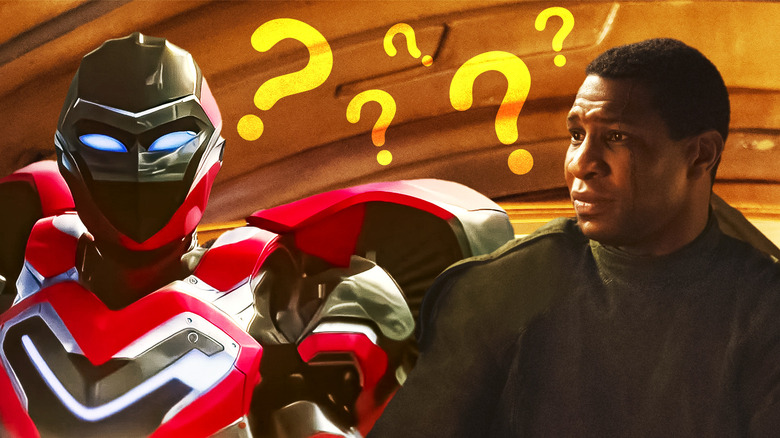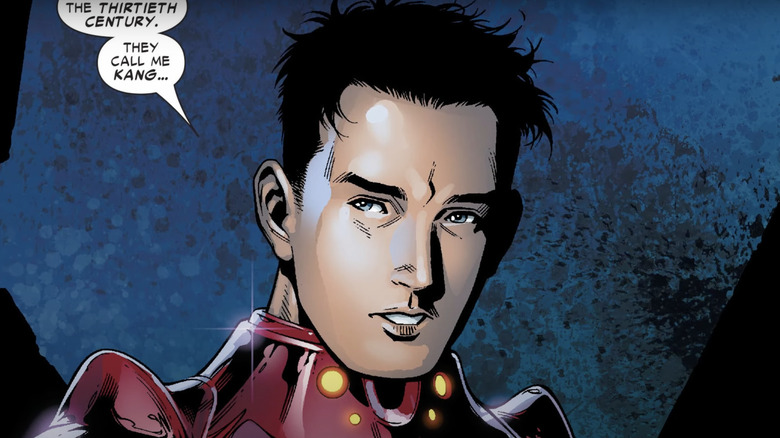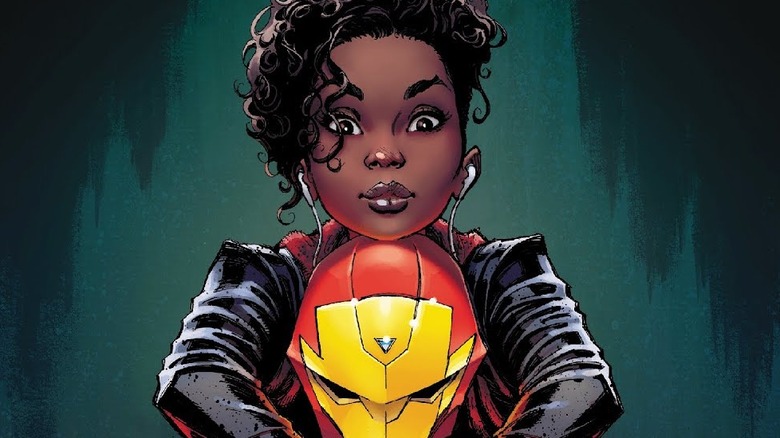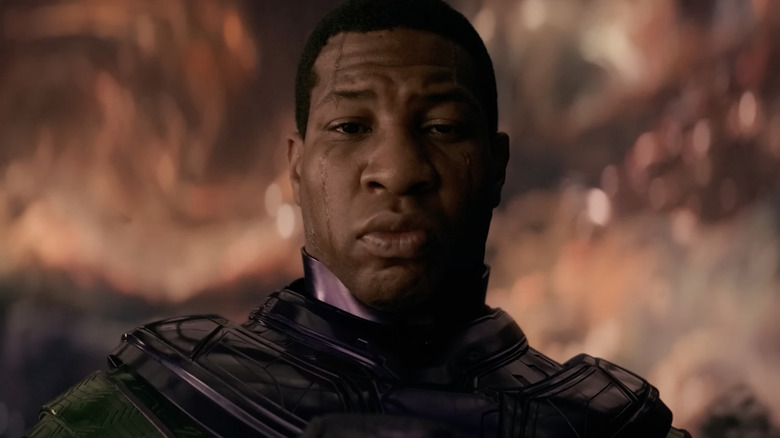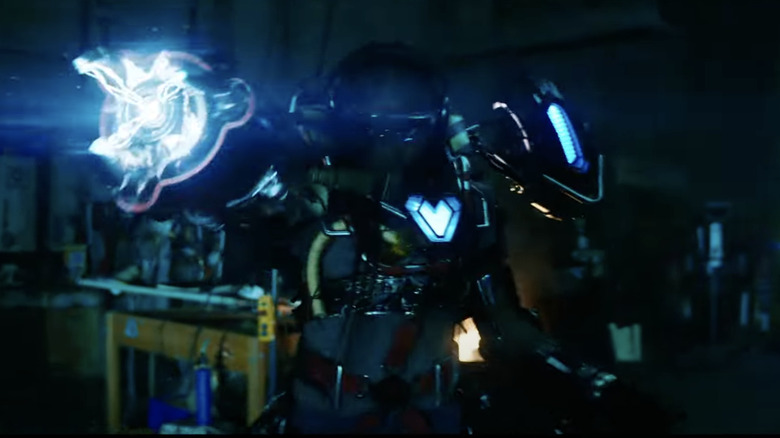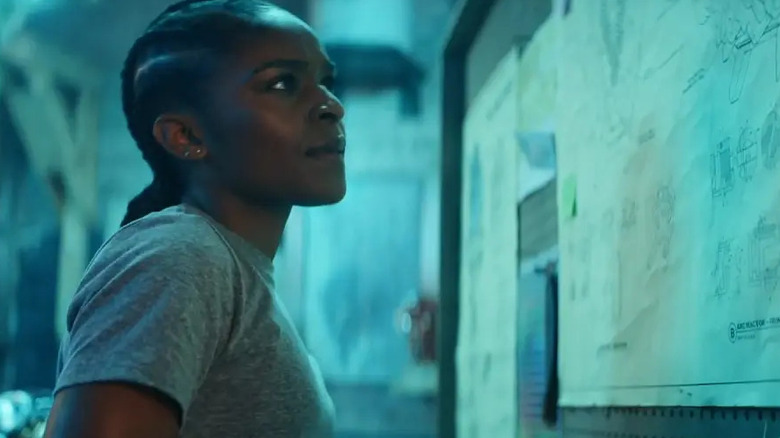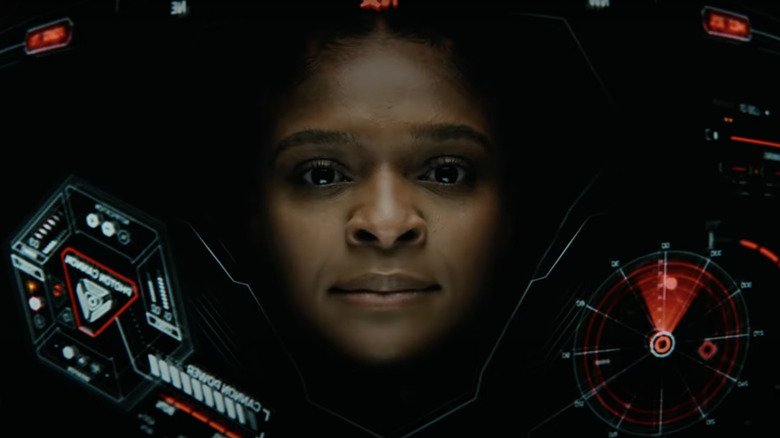MCU Theory - Iron Heart Is Actually A Kang Variant
Look, let's level with each other here. You clicked on the article. You've read the title. You've rolled your eyes or scratched your head at its ridiculous premise — but it's only ridiculous at first glance. The theory that Ironheart is secretly a time-crossed variant of Jonathan Majors' Kang the Conqueror is bizarre, yes, but it also may be the best way to address a certain incoming part of Kang's MCU story.
Riri Williams (Dominique Thorne) was first introduced in last year's "Black Panther: Wakanda Forever" as a supporting player, with the script working overtime just to give her personal stakes in the plot. Her increased distance from the legacy of Tony Stark is admittedly a smart (and necessary) change from the comics, but only a tragic chance encounter makes her a vague acquaintance of Wakanda. As of right now, Williams' connection to the wider MCU is tenuous at best, and virtually non-existent when you consider the multiversal direction it's headed in.
To give her character the impact she deserves, Marvel Studios will have to do something drastic. Now, it'd be easier — and more likely — to just tie her closer to the more grounded Iron Man players, like War Machine. Sure. However, a more intriguing approach would be to take advantage of her specific niche — that is, as a young, gifted genius with a heart of gold — to not only give her a greater presence in the Multiverse Saga, but also answer a question that Marvel Comics fans are all about to start asking: where the heck is Iron Lad?
Wait, who is Iron Lad?
Back in 2005, Marvel wanted a new direction for their long-running "Avengers" series, which resulted in movies and TV screenwriter Allan Heinberg ("Wonder Woman," "Sandman") and prolific Marvel artist Jim Cheung pitching a younger version of the iconic super-team — "Young Avengers." This team would provide new and returning readers a clean entry point into the Marvel Comics universe through fresh legacy characters, most of whom had already been created and developed, but just needed a narrative reason to come together. Enter, Iron Lad.
At some point in the distant future, Kang the Conqueror sought out a younger version of himself in order to save his life and put him on the path to conquest as early as possible. After showing a teenage Kang (aka Nathaniel Richards) the wealth of his violent future, the boy becomes horrified by his destiny and chooses instead to travel back in time to prevent his future self from ever coming to power. Dawning his own Iron Man armor, Nate Richards takes on the name Iron Lad.
Yes, yes, the story is a bit convoluted, but if it wasn't, comics wouldn't be half as fun. Moving on: after failing to make contact with the actual Avengers (they were "Disassembled" at the time), Nathaniel uses their data to recruit Eli Bradley aka Patriot, Billy Kaplan aka Wiccan, and Teddy Altman aka Hulkling (the first Young Avengers team was a bit of a "Dudes Rock" moment). Eventually, the team welcomed Kate Bishop aka Hawkeye and Cassie Lang aka Stature, as well as a resurrected version of the Vision.
If these names are suddenly sounding familiar to MCU fans, that's because all of these players have already been introduced — except Iron Lad. And here's where Riri could come in.
Riri Williams could be the MCU's version of Iron Lad
Fast forward to 2023 — "Hawkeye" and "Ant-Man and the Wasp," despite their faults, successfully established Kate Bishop (Hailee Steinfeld) and Cassie Lang (Kathryn Newton) as full-fledged superheroes. Billy Kaplan (Maximoff) and his brother Tommy (a future Young Avenger himself) have been a major focus in both "WandaVision" and "Doctor Strange in the Multiverse of Madness" — the former of which even introduced a resurrected Vision. Even Eli Bradley got a little screen time in "The Falcon and the Winter Solider." The MCU is sprinting toward a Young Avengers team, but it's missing its founder — or so they'd like you to think.
So, what if Ironheart could be the MCU's take on Iron Lad?
This theory could play out in one of two ways. First, Riri's origins (which are currently imperceptible) could be revealed to be nearly identical to the comics' Nathaniel Richards — a temporal refugee, Riri fled her original timeline after a Kang variant attempted to steer her toward their shared murderous destiny. Her father, whom she mentions in "Wakanda Forever," might not be dead but instead left behind in the future. Or maybe he did die, but only after bringing her to the present day as an infant when Kang revealed to Riri's father the truth about his daughter's dark future, or what have you. You get the idea. There are options.
A second possibility: she could be, as of yet, unaware of her relation to Kang, with a member of the impending Council eventually making this known to her in her own series or in "Kang Dynasty." In either case, this story wouldn't be as bonkers as it first sounds.
How can Riri Williams be Kang?
In fairness, the films thus far have developed both Kang's background so little that basically every aspect of his identity is open to speculation, bringing the bedrock of this theory dangerously close to "Well, you can't prove she's not a Kang variant!" However, when you begin trying to fit Riri Williams into the Iron Lad role, it's surprising how well it works.
There are small factors, like how "Loki" introduced the idea that variants can look vastly different from one another. Isn't it weird that every Kang variant so far looks like Jonathan Majors? Don't expect that to necessarily stay the case: there's no reason a Kang variant can't be Dominique Thorne. Also, note how "Quantumania" introduced a device that allows Kang to literally show others his history, setting up the potential for him to demonstrate his destiny to a young Riri — identically to how he does in the comics. In "Quantumania," fans were even picking up LGBTQ+ vibes from Cassie Lang and Jentorra, and in the comics, Cassie's major romantic relationship is with Iron Lad — it's worth noting, then, that the comics also depict Riri struggling with her sexual identity. Having only one queer couple on the Young Avengers? Tired. Reinventing #IronStature as a queer love story? Wired.
Then, there's the fact that Riri is the only MCU super-scientist yet to have the origins of her genius explored.
Most of the pieces to make Ironheart a perfect MCU Iron Lad equivalent are already in place, though this may not be enough to trump the obvious issues for some fans. After all, a twist like this would be a bafflingly hard left turn for Riri Williams, one that ignores her comics lore and potentially undermines what already makes her unique.
Wait, what is Ironheart's origin story again?
In more cynical hands, Riri Williams can feel like the blandest sort of legacy character — an well-intentioned addition to a story that needs fresh characters but is ultimately unwilling to relinquish recognizable IP and lacking in imagination beyond the character's basic conception. As such, her origins are often treated as an unimportant but necessary step on the way to getting her in an Iron man suit. It arguably wasn't until Eve Ewing penned the "Ironheart" solo series that she felt like a fully fleshed out character. Even "Wakanda Forever" director Ryan Coogler seemed mostly disinterested in her original paint-by-numbers origins, relegating her past to a few sentences in a voiceover.
While it's smart to ignore the "Tony Stark's rebellious protégé" arc (we've all seen the "Homecoming" trilogy), we also don't have to settle on the "Wakanda Forever" origin. A great superhero origin story gives its subject both powers and purpose — by the final credits, "Wakanda Forever" meets neither goal in regard to Riri. At this point, her future trajectory hasn't been made clear on film.
The Kang theory, however, would provide Williams with both power and purpose in spectacular fashion. Not only would it explain how she became a super genius, but it would give her character the narrative drive and focus that she desperately needs.
But don't Riri's relatable origins make her more special?
Now there may be some readers hesitant to dismiss her relatively straightforward origins because they feel her smaller beginnings make her unique. Why can't she be a good-hearted kid who just decided to become a hero? Doesn't that make her special in a world of gods and magicians?
At this point, we know that Riri Williams is a hero because she was taught specialized skills by a parental figure she loved but didn't get enough time with, and was inspired by a crazy chance adventure with one of the Avengers. Unfortunately, that description literally fits every single potential "Young Avenger" that's been introduced so far. It's even rumored that an early edit of "Quantumania" had Scott stranded in the Quantum Realm (yes, again), meaning that every "Young Avengers" member would be down at least one parent. Giving your whole team parental issues works in a series like "The Runaways," which directly confronts dysfunctional families as a theme and core idea. The "Young Avengers," however, isn't really in the same lane.
It's also tiresome that every young hero introduced since "Endgame" has basically been a quirky, wide-eyed teenager with a vaguely tragic past who gets by on sheer will and the ability to react in a relatable way to things that happen on screen. They're all good-hearted kids who just decided to become heroes. The better question to ask is why can't Riri Williams be more than that? Why can't she be a woman out of time, intimately important to the overarching story and cosmically destined to do battle with a variant of herself? Why can't Riri Williams be the center of her universe?
Riri should be Kang the Conquerer
Before we get carried away, it's only fair that we once again acknowledge the obvious: chances of this happening are remote at best. They've already shot the entirety of the "Ironheart" Disney+ series, and it seems unlikely that they'll make such a drastic move in a smaller venue. If anything, "Ironheart" will serve as a lead-in to the upcoming film "Armor Wars."
On top of that, the Multiverse Saga has bigger fish it's clearly more interested in frying. These three phases are concerned with elevating late-Infinity Saga additions like Shuri, Captain Marvel, and Sam Wilson, while preparing fitting send-offs for more senior characters like Thor, the Hulk, or even Ant-Man. There may not be room to develop these younger characters with much specificity or risk yet. Then again, if that's the case, why introduce them at all?
With all these young heroes now joining the MCU, there's an aching need for something legitimately subversive to be done with any of these new, young characters. For them to be more than props in bigger stories and advertisements for smaller ones. There's an aching to give the audience something to invest in, and then to have that investment rewarded in genuinely surprising ways down the line. In its heyday, this was an area in which the MCU resoundingly exceeded in.
So, you know what, true believers? Until they prove that she's not a Kang variant, we can keep imagining that she is. Is that delusional? Unmistakably. But it's not any more delusional than expecting an audience to engage with an unending onslaught of indistinguishable new additions to an already massive universe.
